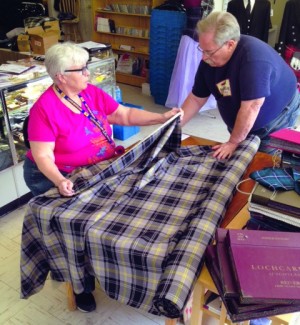When Doreen Browning set out to buy her husband a kilt for his 60th birthday, she embarked on a retirement career for both of them.
Browning went to Ann Stewart, renowned Catskill kilt-maker, to order a Sutherland clan kilt. Recenty retired from Grand Union, she asked the kilt-maker if she needed help with sewing. A deal was struck, and Browning became an apprentice.
When Stewart decided to exit the retail end of her business, Browning bought out her inventory, opening a Highland retail operation. She recruited her husband, Bob, a retired IBM engineer, to handle sales.

- Doreen Browning measures tartan designed in honor of Gen. Douglas MacArthur for the West Point pipe band. Browning and husband Bob, pictured, operate The Kiltmaker”™s Apprentice in Highland.
Their shop at 54 Vineyard Ave. bears the name The Kiltmaker”™s Apprentice, “a tip of the hat to Ann,” says Browning, now no longer an apprentice.
There is no typical day in the Brownings”™ business lives. It might be a visit from a future bridegroom buying his own kilt and arranging for rental kilts for male members of his wedding party. The shop also offers accessories such as jackets, sporrans and kilt hose.
Unlike weddings, there is seldom advance notice for funerals. Browning recalls the occasion when there was no time to shop abroad for the Sutherland plaid, but she found a North Carolina supplier with 10 yards of the tartan in cotton. From this she fashioned rosettes so that every mourner could wear one.
The Brownings supply kilts for such organizations as the St. Andrew”™s Society of the State of New York, which has fashioned its own unique tartan based on the state flag.
The couple also supplies kilts for the West Point pipe band, which honors Gen. Douglas MacArthur with a modified Douglas clan tartan. Graduates of the academy may purchase a West Point tartan kilt with the proper authorization from the academy.
The Brownings report that New York City has its own new tartan, fashioned bearing two gray stripes, one for each of the twin towers. Browning says Sean Connery was the first to don the kilt, which will be seen with other tartans when pipe bands converge on Manhattan to march along Sixth Avenue in the Tartan Day Parade, held on or about April 6.
Playing in pipe bands doesn”™t require a certain ethnic background. Browning recalls a customer with a Polish name and Korean heritage, as well as a night shift commander for the state police whose father was Jamaican and mother South American.
Of the family tartans, Browning finds the Buchanan tartan among the most difficult to work with because of its design, making matching the pattern difficult.
Interest in Scottish attire extends beyond the United Kingdom, Browning says, noting that a Russian television company visited the shop last year and filmed an episode on “How to Wear a Kilt.”
Browning also does repairs. She recalls a gentleman from Scotland who lost everything that was in his basement during Hurricane Irene except his kilt, which was severely damaged. “It was 35 years old,” she says, “but I found the mill that it came from and got it to match. It needed a complete new front apron.”
The Brownings order their materials from four mills in Scotland, one in Wales and one in England.
Both Brownings were raised in Rhode Island and met in Junior Achievement. He is the spouse with the Scottish roots, with the other side of his family being Northern Irish. His wife shares the Northern Irish heritage, but mixed with English “and a tinge of Polish-Russian,” she says. They have three grown daughters and five grandchildren. One of their four grandsons, Alexander Howitt of Highland, sports the MacRae kilt of his paternal grandfather”™s clan.
Challenging Careers focuses on the exciting and unusual business lives of Hudson Valley residents. Comments or suggestions may be emailed to Catherine Portman-Laux at cplaux@optonline.net.















